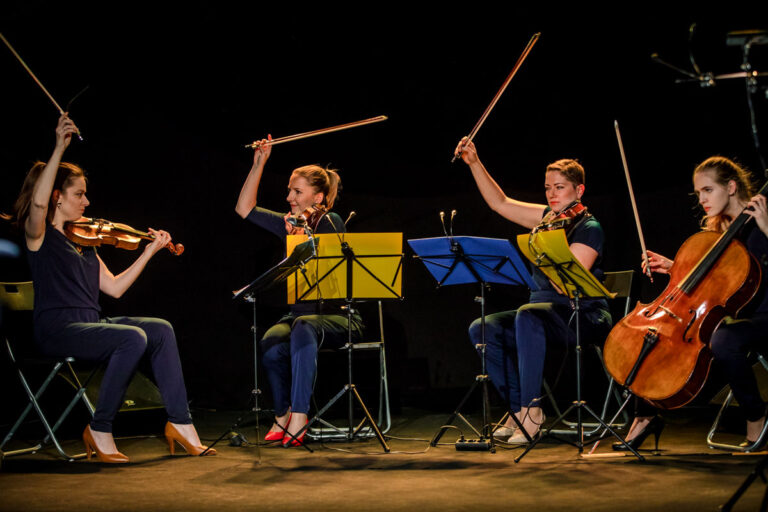Polonika Quartet

Polonika Quartet (formerly Opium String Quartet) has been operating continuously since 2004, when it made its debut at the Jerzy Waldorff summer festival in Radziejowice, gaining enthusiastic reviews. Over the years, the artistic activity of the ensemble has taken on an ever clearer outline and character, which at the turn of 2017/2018 finally decided to change the current name to: Polonika Quartet. The quartet has a versatile repertoire (from classics to contemporary music), but its main focus is Polish music. Polonika has completed several dozen world premieres of this music (including numerous phonographic premieres), and the composers themselves willingly dedicate their works to the quartet. For the quartet, among others: Suita Polska, String Quartet No. 3, Fryderyk’s Dream, Opera-Language Dizziness miniopera for children by Maciej Małecki, Fantasy on Polish Topics for Quartet and Orchestra by Korean composer Eunho Chang, and String Quartet No. 3 „Il Destino” commemorating the heroes of the Warsaw Uprising by Joanna Bruzdowicz. The Polonika Quartet is also the initiator and creator of such literary and musical programs as: Flowering Cross, Saved Sounds, Tango Therapy. Each of the quartet’s albums with the music of Polish composers presents different styles and musical genres. The debut album of the quartet Back to Melody with the music of Wojciech Kilar, Maciej Małecki and Sławomir Czarnecki was nominated for the Fryderyk 2011 award in the Phonographic Debut category. The quartet’s second album, released in 2012, was devoted to the work of Maciej Małecki. Another Chagall for Strings album (inspired by the paintings of Marc Chagall) with works by Piotr Moss and a with the guest appearance of Jadwiga Rappé, was awarded by the Polish Phonographic Academy with the Fryderyk 2014 statuette in the „Contemporary Music Album of the Year” category. The next album, devoted to the chamber music of Ryszard Sielicki, was released in autumn 2017, and the album Urban dances with debut chamber compositions by Miłosz Wośko in 2019. Currently, the group is preparing a recording of the educational Mini Opera for Children. This original musical performance, realized in 2017 with the music of Maciej Małecki and a libretto by Magdalena Małecka-Wippich, and the participation of excellent soloists (Joanna Freszel, Artur Janda), met with the delight of the children’s audience. The Polonika Quartet has extensive stage experience and still performs. The ensemble has participated in many prestigious music festivals throughout the country, such as: Composers’ Portraits, Music Gardens, Warsaw Music Encounters, Warsaw Autumn, Chopiniana, Signed – Fabryka Trzciny, „… and Lutosławski”, Chain IX, Jewish Culture Festival Singer’s Warsaw , The Fryderyk Gala, the International Festival of Stars FORTE Piano in Toruń, the Music Festival in Łańcut, or the Multicultural Festival Galicja. The Polonika Quartet has also performed in Germany, France and Ukraine. As part of perfecting the performing and interpreting art, the ensemble took part in the Rencontres Musicales en Seine en Marne et dans L’Yonne festival, and the Master Academy under the direction of Natalia Prischepenko, to which it qualified from among several dozen European quartets in 2014. The quartet constantly collaborates with musicians, arrangers, actors and stage stars, such as: Teresa Budzisz-Krzyżanowska, Krzesimir Dębski, Maciej Grzybowski, Jan Nowicki, Włodzimierz Korcz, Urszula Kryger, Alicja Majewska, Włodek Pawlik, Wojciech Pszoniak, Jadwiga Rappé, Anna Seniuk , Tomasz Stańko, Tomasz Strahl, Mieczysław Szcześniak, Miłosz Wośko, and Jerzy Zelnik. In addition, the Polonika Quartet has repeatedly participated in recordings of music for performances at the National Theater in Warsaw, as well as many commercial recording sessions (including, for example, recording music by Tomasz Łuc for the film Mały Jakub, awarded at the Polish Film Festival in Los Angeles) The group’s reputation is also confirmed by the support of such institutions and cultural organizations as: the Ministry of Culture and National Heritage, the National Institute of Music and Dance, Adam Mickiewicz, Foundation of Polish Culture, Association of Artists and Performers STOART, Program II of Polish Radio, Foundation in Love Warsaw, or the French ProQuartet foundation. The Polonika Quartet is made up of graduates of the Academy of Music. Fryderyk Chopin in Warsaw (now the University of Music) composed of: Paulina Kusa – violin, Anna Szalińska-Zaziębło – violin, Magdalena Małecka-Wippich – viola, Olga Łosakiewicz-Marcyniak or Krystyna Wiśniewska – cello.
